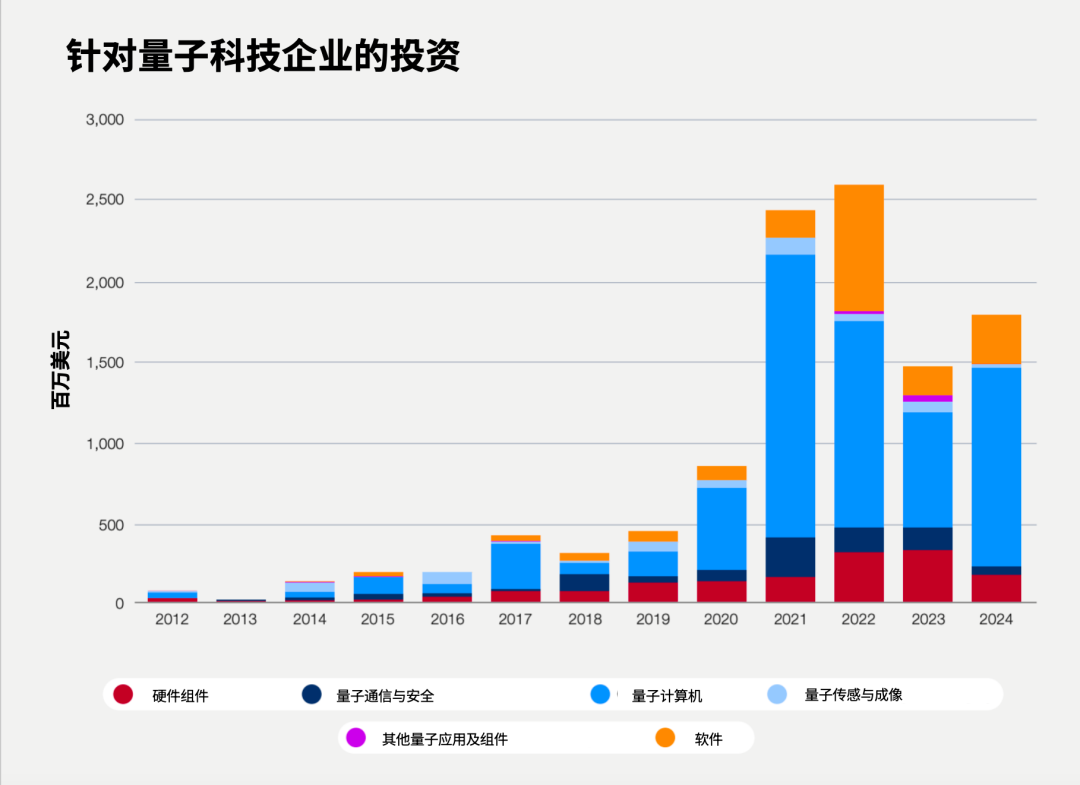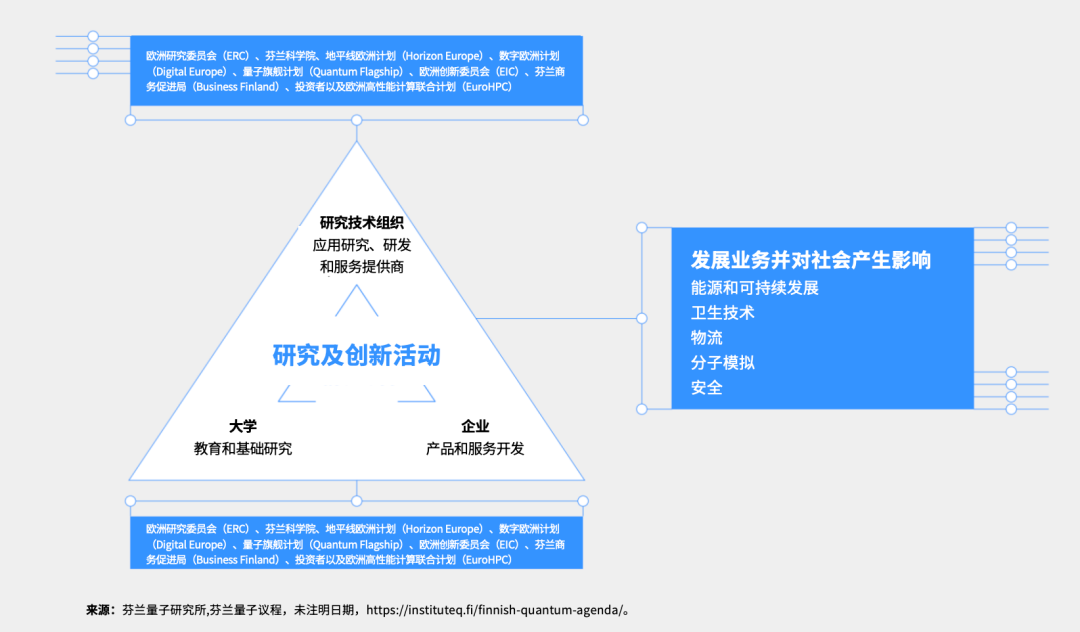

If we can work together to raise awareness and increase investment, quantum computing could transform businesses.
Image source:Getty Images/Cecilie_Arcurs
Katia Moskvitch
Head of Quantum Technologies at the World Economic Forum
Research institutions and companies like IBM, Google, and Quantinuum are advancing quantum computing technology and have already achieved significant breakthroughs across multiple fields.
2025 marks the United Nations International Year of Quantum Science and Technology, a time when, while celebrating this groundbreaking progress, people are also given an opportunity to discuss the advantages and immense potential of quantum technologies with the public.
Raising public awareness, strengthening education and training, and increasing investment are key to cultivating relevant talent, building a robust quantum economic ecosystem, and supporting the future development of this critical technology.
Research institutions and companies like IBM, Google, and Quantinuum are advancing quantum computing technology and have already achieved remarkable breakthroughs across multiple fields. 2025 has been designated by the United Nations as the International Year of Quantum Science and Technology, offering a perfect opportunity for people to celebrate these advancements while also fostering public dialogue about the immense potential and benefits of quantum technologies. Enhancing public awareness, strengthening education and training programs, and increasing investment efforts are essential steps in nurturing skilled talent, building a robust quantum economy, and ensuring the sustainable growth of this transformative technology in the years to come.
Before February 19, 2025, most people likely knew nothing about the name "Majorana." But on that very day, Microsoft announced the development of its first chip powered by "topological qubits." These qubits are reportedly built using an elusive particle known as the "Majorana fermion," named after the Italian physicist Ettore Majorana.
Quantum computers rely on quantum bits (qubits) to encode information as 0s and 1s, while leveraging the peculiar properties of atoms and microscopic particles to tackle complex mathematical problems that are either too challenging or time-consuming for classical computers. Microsoft’s topological qubit approach is one of the many pathways being explored by both academia and industry as they work toward building the quantum computers of tomorrow.
Once fully mature, quantum computers will excel in tasks that require extensive probabilistic calculations to identify optimal solutions. For instance, airlines seeking to optimize flight routes—such as determining the best balance between travel time and fuel efficiency when flying from Sydney to New York—could benefit greatly. Similarly, pharmaceutical companies developing new drugs would find quantum computing invaluable for precisely arranging atoms to synthesize novel molecules. Quantum computers can swiftly explore countless possible scenarios, pinpointing the most efficient and effective solutions.
Additionally, quantum computers are poised to open new doors for global businesses in areas such as developing new materials, predicting financial market volatility, and enhancing manufacturing and design efficiency. Meanwhile, AI is expected to further amplify the power of quantum computing.
Although some researchers remain skeptical about Microsoft's announcement regarding Majorana fermions, the stock prices of quantum computing companies have surged dramatically in the days following the news. More broadly, even casual discussions—however tangentially related—at quantum-related conferences and events have begun to casually incorporate the term "Majorana fermion" into conversations. Even mainstream media outlets are now reporting on recent efforts by researchers to advance this cutting-edge technology.

Detailed breakdown of quantum computing technology investments over time.
Image source:The World Economic Forum, in collaboration with Accenture, has jointly released the report titled "Quantum for Society: Unlocking Ambitions to Achieve the Sustainable Development Goals."
While quantum computers won't replace traditional ones, they hold the promise of outperforming them in certain specialized tasks—particularly in fields like medicine, chemistry, materials science, finance, and manufacturing. That’s why governments, universities, and companies around the world are actively investing in quantum technologies and cultivating top-tier talent to support their scalable growth.
However, achieving true "quantum advantage"—where quantum computers can solve real-world problems that traditional computers simply can't handle—will require more investment and support. While global awareness of quantum technology is steadily growing, we still need to deepen our understanding of its current stage of development and bridge the gap between today's capabilities and the realization of that transformative "advantage."
Quantum Computing: From Superconductors to Ions and Light
Although research in quantum information theory began in the 1960s, discussions about the real possibility of "building a quantum computer" truly took off in the early 1980s. In 1980, American physicist Paul Benioff and Russian mathematician Yuri Manin independently explored, each from a mathematical perspective, the feasibility of constructing a machine that could harness the laws of quantum mechanics. Then, in 1982, American physicist Richard Feynman further delved into this idea in a groundbreaking paper, arguing that quantum computers would be essential for efficiently simulating the intricate complexities of the natural world. This insight spurred researchers to start turning theoretical concepts into practical realities.
Today, several companies—including Google, IBM, and Rigetti Computing—are betting on superconducting qubits. This approach relies on circuits made from superconducting materials, whose electrical resistance drops to nearly zero at a critical temperature, enabling highly efficient conductivity.
In November 2024, IBM unveiled its second-generation Heron chip at the IBM Quantum Developer Conference, featuring 156 qubits and already being utilized by customers worldwide. IBM’s quantum roadmap outlines an ambitious goal: to develop a fully functional, fault-tolerant quantum computer by 2029. The company is steadily advancing toward this milestone, with a strong focus on error mitigation and further scaling up its quantum technology.
In a recent IBM paper, it was noted that its quantum computer has already outperformed classical computers in certain applications, demonstrating what IBM calls "quantum advantage"—the ability of quantum computers to tackle scientific and practical tasks that go beyond the capabilities of even the most powerful classical computing systems. The latter relies on a brute-force approach, where all possible solutions are systematically tested until the correct one is found, whereas quantum methods can evaluate multiple solutions simultaneously.
Meanwhile, last year Google published a paper detailing how its scientists achieved remarkably low error rates on the quantum chip Willow, drawing widespread attention. The paper has been hailed by researchers around the world as a significant step forward—and indeed, it is. Error correction remains an area where the entire industry is investing considerable effort, with numerous companies and academic experts striving to develop qubits capable of delivering error-free outputs, often referred to as "high-fidelity" qubits.
These efforts appear to be paying off. According to industry insiders and academic reports, the quality of qubits is steadily improving. For instance, Amazon Web Services (AWS)'s Ocelot—set to launch in 2025—comes equipped with error-correction capabilities right from the start. The chip is based on "cat qubits," a name inspired by the famous Schrödinger's cat thought experiment, where certain types of errors are inherently suppressed, making it easier to correct any remaining mistakes that might arise.
There are other approaches to quantum computing as well. Companies like Quantinuum and IonQ are leveraging laser-trapped ions to build qubits, demonstrating impressive fidelity in the process. However, ion-trapping systems currently operate at slower speeds compared to superconducting qubits, so these companies are also actively working to boost their computational speed.
Xanadu, PsiQuantum, Pasqal, and several other companies are exploring the use of "photonics" to build quantum computers—devices that leverage light to process data. For instance, Xanadu has just unveiled a new system called Aurora. The company describes it as the first photonic quantum computer capable of scaling up to large-scale operations, connecting multiple modules via fiber optics.
Meanwhile, D-Wave recently announced it has achieved "computational supremacy" in the field of quantum simulation—meaning its quantum computer can solve problems that would be impossible for classical machines to tackle—though two research teams have already questioned this claim. The company stated that its Advantage quantum computer can simulate the properties of magnetic materials, a task that would take traditional machines thousands of years to complete.
Companies like NVIDIA are leveraging technologies—including AI-driven algorithms—to enhance the reliability of quantum systems. NVIDIA’s approach involves simulating quantum error-correcting codes and optimizing error-mitigation strategies. This is critical for building fault-tolerant quantum computers, which can continue operating reliably despite the presence of errors.
Let’s return to Microsoft’s elusive Majorana fermions—though, in fact, Microsoft has yet to provide evidence compelling enough to satisfy its critics. Even if this breakthrough doesn’t materialize, we must continue advancing the development of quantum computing. After all, if the players in the quantum field are right, a fully functional, fault-tolerant quantum computer could become a reality within as little as a decade.

How Finland's quantum computing ecosystem is being built.
Image source:World Economic Forum's "Blueprint for the Quantum Economy"
Is the world ready to embrace quantum computing?
Although public understanding of quantum computing is steadily growing, most businesses still lack awareness of the significant advantages it could bring to a wide range of industries. That’s why, while advancing this technology, we must also begin nurturing the quantum economy.
This will require both public and private investment to ensure that research efforts continue to advance—driven by collaboration between industry labs, academic institutions, and public-private partnerships. According to Accenture’s research, global hyperscale enterprises (providers offering massive computing and storage capabilities) remain the primary investors in quantum computing. They view this emerging technology as the next frontier of cloud computing and are committed to leading the global shift toward quantum-driven innovation.
Additionally, popularizing quantum knowledge starting from elementary school, deepening education further in middle and high school as well as at the university level, and offering tailored training programs in the workplace are all key to nurturing the quantum talent of tomorrow.
This is how we cultivate the next generation of quantum leaders—only when tomorrow’s programmers and CEOs alike fully grasp the business potential of quantum computing can the world truly unlock the "quantum advantage."

The above content solely represents the author's personal views.This article is translated from the World Economic Forum's Agenda blog; the Chinese version is for reference purposes only.Feel free to share this in your WeChat Moments; for reprints, please leave a message at the end of the article or on our official.
Editor: Wan Ruxin
The World Economic Forum is an independent and neutral platform dedicated to bringing together diverse perspectives to discuss critical global, regional, and industry-specific issues.
Follow us on Weibo, WeChat Video Channels, Douyin, and Xiaohongshu!
"World Economic Forum"


